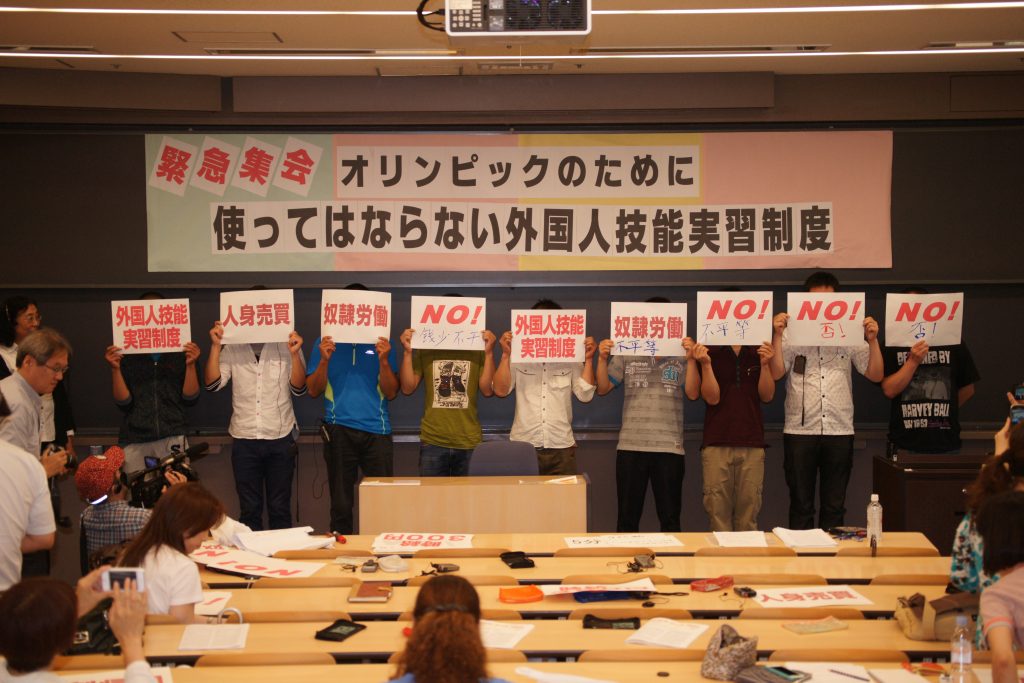Memo #343
By: Daniel Kremers – kremers [at] dijtokyo.org
 Intense debate currently surrounds the Technical Internship Training Program (TITP), Japan’s major source for lesser skilled temporary migrant workers, just five years after the last major revision of immigration laws in 2010. The program consists of three years of employment in manual jobs in mostly small and medium sized enterprises in metal processing, textiles and agriculture, and is largely a conduit for Chinese and other Asian nationalities of all genders.
Intense debate currently surrounds the Technical Internship Training Program (TITP), Japan’s major source for lesser skilled temporary migrant workers, just five years after the last major revision of immigration laws in 2010. The program consists of three years of employment in manual jobs in mostly small and medium sized enterprises in metal processing, textiles and agriculture, and is largely a conduit for Chinese and other Asian nationalities of all genders.
The controversy stems from the fact that on the one hand, the Japanese government promotes the program as a form of technology transfer from Japan to migrant-sending countries. Moreover, since his reelection in 2012, Prime Minister Shinzo Abe has focused economic growth. The reconstruction on the tsunami devastated Japanese north-eastern cost and the preparations for the Olympic summer games in 2020, have increased demand for and exacerbated shortages of the supply of manual laborers, mainly in the construction sector. Employer interest groups have, therefore, demanded the expansion and liberalization of the TITP. Recently, such voices advocating the expansion of the program have become louder, and the government has included them into its 2014 Plan for Growth . Specifically, starting in April 2015, migrants that have completed their TITP in construction and shipbuilding industries are to be offered an additional one-to-two-year work permits under the residence status for “specified activities,” ostensibly addressing the labor shortage in these sectors.
On the other hand, critics have called the TITP a side door for low-wage workers to enter Japan, while Migrant Advocacy Organizations such as the Solidarity Network with Migrants Japan (SMJ) have flagged poor working conditions and recurring human rights violations within the program. SMJ, other migrant interest groups, and bar associations are calling for the abolishment of the program, and replacing it with a policy of issuing renewable working permits for everyone finding employment in Japan, independent of skill level and type of occupation. The TITP in its current form, they argue, fosters human trafficking of workers into exploitative and coercive situations.
Migrant rights and the TITP in particular will and should continue to be key policy issues to debate for Japan’s current and future social and economic politics and justice.
About the Authors:
Daniel Kremers is a senior research fellow at the German Institute of Japanese Studies in Tokyo. Together with Tilman König he co-directed the documentary “Sour Strawberries – Japan’s hidden ‘guest workers’”.
“Sour Strawberries” is a documentary on migrant workers, human rights, exploitation and discrimination in Japan.

This photo shows migrant interns at a union event in Japan, protesting the use of migrant interns on Olympic construction sites (Credit: Solidarity Network with Migrants Japan).
Links
- Daniel Kremers, “Transnational Migrant Advocacy from Japan: Tipping the Scales in the Policy Making Process,” Pacific Affairs 87, no. 4 (December 2014): 715-741.
- Tilman König and Daniel Kremers, dir., Sour Strawberries: Japan’s hidden “guest workers” (2008)
- Meng Liang, “‘Place making’ in Kawakami: Aspirations and migrant realities of Chinese ‘technical interns’” Contemporary Japan 26, no. 2 Destination Japan: Population Aging and International Labor Migration.: 245-262
- Ministry of Justice, Japan 2014 Immigration Control Whitepaper.
- State Department, United States, “Trafficking in Persons Report Heroes: Ippei Torii.
- Japan Federation of National Service Employees, “Revising the TITP, Reforming Foreign Worker Policy” (Japanese)日本国家公務員労働組合連合会、技能実習制度を見直し、外国人労働政策の転換を.
- Japan Federation of Bar Associations, “Opinion on the 5th Basic Plan for Immigration Control Opinion on the (draft)” (Japanese) 日本弁護士連合会, 第5次出入国管理基本計画(案)に関する意見書.
- Tsuchida Michio, “Employment for Foreign Workers and Issues in Labor Law,” Ritsumeikan Law Review (2014): 78-110 (Japanese) 土田道夫「外国人労働者の就労と労働法の課題」『立命館法学』no. 5-6 (2014): 78-110.
Related Memos:
See our other memos on Japan.